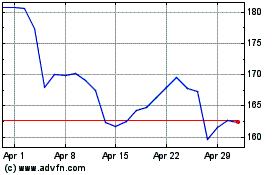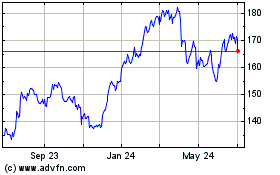By Jared S. Hopkins
AbbVie Inc.'s pricing practices for some of its top-selling
medicines faced fresh scrutiny from federal lawmakers Tuesday, the
latest effort by members of Congress probing the cost of
prescription drugs.
Democratic members of the U.S. House Committee on Oversight and
Reform have been investigating how AbbVie sets the prices of some
of its products, including its top-selling immunology drug,
Humira.
At the hearing, committee members questioned AbbVie Chief
Executive Richard Gonzalez about price increases for Humira as well
as AbbVie's patents and other efforts to protect the drug from
competition from lower-priced copies known as biosimilars.
Mr. Gonzalez said lowering drug prices alone wouldn't increase
access to prescription drugs for patients, including some Medicare
patients. He said AbbVie provides medications to some patients who
can't afford them at no-cost or through co-pay assistance.
"Overall, most Americans have access to affordable medicines,"
he said. "As we tackle the issues of drug pricing and access, it's
important that we focus on what's working and what needs to change
to make sure that patients get the medicines they need."
The company "seeks to overwhelm potential competitors with the
sheer number of patents on Humira regardless of whether individual
patents were properly granted under U.S. law," committee Democrats
wrote in a report released before the hearing. "If one patent is
invalidated, AbbVie has another patent waiting."
Mr. Gonzalez defended AbbVie's approach on patents, saying the
company continued to study the drug after its initial approval,
which led to its use for multiple diseases.
"We patent innovation that we believe is meaningful and that we
invested in," he said.
AbbVie declined to comment beyond Mr Gonzalez's testimony, a
spokesman said.
Republican members of the committee didn't issue a report
related to AbbVie's pricing of its products.
Patents on Covid-19 vaccines have emerged as an issue in the
coronavirus pandemic, as some governments push for intellectual
property rights to be temporarily waived to spur additional
production.
The Biden administration recently lent its support for
temporarily waiving the vaccine patents.
Humira, which treats a range of immune conditions including
rheumatoid arthritis and gut disorders, is the top-selling drug in
the U.S. with more than $16.1 billion in sales last year.
AbbVie has raised Humira's price 27 times since it launched in
2003, with a year's supply now costing $77,586 before insurance and
rebates, according to the report by committee Democrats. Humira's
current price is 470% higher than from when the drug launched in
2003, according to the report.
The initial U.S. patent for Humira expired in December 2016, but
the company has been taking out additional patents covering its
formulation and manufacturing, among other things.
AbbVie executives in 2014 forecast Humira biosimilars would
arrive in the U.S. in 2017 and decrease sales by $1.5 billion that
year, according to the report, citing company documents.
The drugmaker, based in the suburbs of Chicago, has obtained or
applied for at least 257 Humira patents, 90% of which were filed
after the drug was launched, according to the report.
Mr. Gonzalez testified that AbbVie has a high number of Humira
patents partly because the federal government's patent office
sometimes asks patents not to be too broad. He also said that
companies are able to challenge patents in court.
"Everyone gets somewhat hung up on the number of patents," he
said.
The company obtained eight patents under a law designed by
Congress to encourage development of drugs for rare diseases
affecting fewer than 200,000 people in the U.S., according to the
report.
In one instance, AbbVie split the patient population of a rare
skin condition into two, a general one and one for patients at
least 12 years old. The maneuvers extended Humira's patent
protection beyond the seven years intended by the federal
orphan-drug law, according to the report.
AbbVie viewed the U.S. patent system as more permissive than
other countries' intellectual-property systems, the Democrats on
the committee said, citing company documents.
Europe's patent system precluded many patents obtained in the
U.S., according to one of the company documents, an AbbVie white
paper, that the committee Democrats cited. In Europe, several
biosimilars to Humira have been available since 2018 at a reduced
price.
The first lower-priced alternatives to Humira, known as
biosimilars, aren't scheduled to hit the U.S. market until
2023.
AbbVie staved off biosimilar competition by reaching deals with
companies that agreed to delay launches of their lower-priced
copies, according to the report and the companies.
Some of these biosimilars have been approved for several years.
A biosimilar from Amgen Inc., which is scheduled to launch in 2023
under an agreement with AbbVie, was approved by regulators in
2016.
The House committee's chairwoman, Rep. Carolyn Maloney (D.,
N.Y.) and two other Democrats, David Cicilline (D., R.I.) and Jerry
Nadler (D., N.Y.), asked the Federal Trade Commission on Tuesday to
investigate whether AbbVie violated the law in trying to keep
biosimilars to Humira from launching, according to a copy of the
letter.
AbbVie didn't respond to a request for comment about the letter.
An FTC spokesman said the agency doesn't publicly comment on
investigation requests.
Write to Jared S. Hopkins at jared.hopkins@wsj.com
(END) Dow Jones Newswires
May 18, 2021 15:55 ET (19:55 GMT)
Copyright (c) 2021 Dow Jones & Company, Inc.
AbbVie (NYSE:ABBV)
Historical Stock Chart
From Mar 2024 to Apr 2024

AbbVie (NYSE:ABBV)
Historical Stock Chart
From Apr 2023 to Apr 2024
